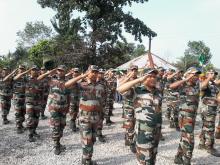More than sixty five thousand small tea growers of Assam are facing uncertain future due to unilateral decision of state government, imposing surcharge on green tea leaves at the rate of 20 paisa per kg in addition to a fine of Rs 200 per Bigha, with effect from July 1, 2003. For more than three decades since the year 1978, indigenous youths of Assam with their capital and labor established more than 65 thousand small tea gardens in the state. These tea growers through schemes of self-employment, earned livelihood for their families. Besides that, they provided indirect rehabilitation to about nine lakhs people. These tea farmers helped in building socio-economic structure by producing twenty nine percent teas produced in the state of Assam and fourteen percent of India. It also protected the land in use by small tea farming around state tea borders.
Depending upon the green leaves from the small farmers 220 brought-leaves factories came up in the state. The small tea growers have been supplying green leaves to about 300 factories. It is a matter of great regret that even after six decades of independence of the country the indigenous people of this state have not been given settlement of land.
Out of 65,000 unsettled small tea farmers only 3,000 have got registration with the Tea Board of India. These small farmers are in position to get monetary assistance from the financial institutions. In the neighboring Arunachal Pradesh, all small tea growers even got registration with the Tea Board, as they have been given settlement of land. It may be mentioned in this connection that In Tamil Nadu out of 63,000 farmers all are registered with Tea Board.
All Assam Small Tea Growers Association (AASTGA), an organization of small tea growers established in 1987, appealed to the state government, chief minister and high officials, several times and launched agitation, had discussions, but it did not get any fruitful results. All efforts had gone to deaf ears. On the other hand by increasing revenue and fine, the government is trying to deprive them getting even their livelihood.
It may be added in this context that in the budget of 2008-09, there was a proposal to collect surcharge of 20 paisa per kg from the purchaser. But the Assam Taxation (on Specified Land Amendment) Act 2009, this tax is being collected from the small tea growers only. The Brahmaputra Valley tea growers have to pay this tax at the rate of 32 paisa per kg and the Barak Valley farmers @ 29 paisa. In contrast of this the big tea gardens having more than thousand Bigha of land are exempted, while small tea growers having below 75 Bighas are affected by imposition of surcharge at the rate of 20 paisa per kg.
According to Land Reforms Act 1997, the small farmers having land up to 30 Bigha were exempted from all type of taxation. During last decade the rate of tea leaves produced by small farmers was Rs.8 per kg, whereas the production cost of green leaves was Rs.7, 50. The production per Bigha varies from 800 to 1500 kgs. Keeping the average production at 1200 kgs too, the expenditure on production comes to Rs.9,000 and income; Rs.9,600 With this income of Rs.600 per Bigha on 30 Bigha land, total earning comes to Rs.18,000 annually, which is not sufficient to support even a small family.
The AASTGA, representing the small tea growers recently in an interaction with media revealed that the present chief minister, Tarun Gogoi, erstwhile the leader of opposition on September 4, 2000, had assured the agitating small tea growers, that if his government came to power, he would redress all the problems, but after completing two terms as chief minister, he has forgotten those assurances.







Comments
Pages
Add new comment